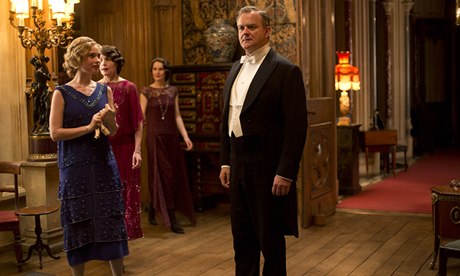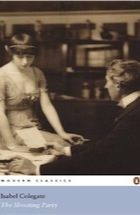Isabel Colegate's The Shooting Party, published in 1980, is an acknowledged influence on Julian Fellowes's ratings monster. But what can we glean from it about where the story will go?

Estate of play … Lily James, Michelle Dockery and Hugh Bonneville in Julian Fellowes's Downton Abbey. Photograph: Nick Briggs
With the arrival of news that Downton Abbey is to return for a fifth series, speculation rises over what Julian Fellowes has in store for us. How long can Mary's vision withstand the punishing regime of never-ending eye-rolling over Edith's love life? Will Carson ever recover from Mrs Hughes installing an electric toaster? Has Daisy finally learned to breathe through her nose? For those starting to wonder if Downton is in danger of going on so long that it catches up with the 21st century, there is one book that reveals Fellowes's motivations, intentions and predilections: The Shooting Party by Isabel Colegate.(Penguin Modern Classics)
 Set in 1913, the novel comprises one day in the life of a large country house. The men are guffawing and shooting, the ladies are frostily lunching and servants dart hither and thither like beleaguered nymphs as Colegate meditates on Fellowes' favourite themes: frustration, friction between the classes, tradition v progress, and the imminent disintegration of an aristocratic world. The day culminates in a moment of tragedy that tugs at the tightly woven lives of the masters and their servants and forces both groups to realise the extent of their dependence on each other.
Set in 1913, the novel comprises one day in the life of a large country house. The men are guffawing and shooting, the ladies are frostily lunching and servants dart hither and thither like beleaguered nymphs as Colegate meditates on Fellowes' favourite themes: frustration, friction between the classes, tradition v progress, and the imminent disintegration of an aristocratic world. The day culminates in a moment of tragedy that tugs at the tightly woven lives of the masters and their servants and forces both groups to realise the extent of their dependence on each other.
When The Shooting Party was published in 1980, the popular representation of the aristocracy was as a bunch of bungling toffs: weak chins and weak morals abounded, while servitude was either mocked or ignored. Colegate, however, chose to dispense with these tropes and present everyone as humans instead of saints or villains. The book, written at the height of Thatcherism, is a precursor to Fellowes's forelock-tugging that shows both poor and rich characters in a sympathetic light.
More
 Set in 1913, the novel comprises one day in the life of a large country house. The men are guffawing and shooting, the ladies are frostily lunching and servants dart hither and thither like beleaguered nymphs as Colegate meditates on Fellowes' favourite themes: frustration, friction between the classes, tradition v progress, and the imminent disintegration of an aristocratic world. The day culminates in a moment of tragedy that tugs at the tightly woven lives of the masters and their servants and forces both groups to realise the extent of their dependence on each other.
Set in 1913, the novel comprises one day in the life of a large country house. The men are guffawing and shooting, the ladies are frostily lunching and servants dart hither and thither like beleaguered nymphs as Colegate meditates on Fellowes' favourite themes: frustration, friction between the classes, tradition v progress, and the imminent disintegration of an aristocratic world. The day culminates in a moment of tragedy that tugs at the tightly woven lives of the masters and their servants and forces both groups to realise the extent of their dependence on each other.When The Shooting Party was published in 1980, the popular representation of the aristocracy was as a bunch of bungling toffs: weak chins and weak morals abounded, while servitude was either mocked or ignored. Colegate, however, chose to dispense with these tropes and present everyone as humans instead of saints or villains. The book, written at the height of Thatcherism, is a precursor to Fellowes's forelock-tugging that shows both poor and rich characters in a sympathetic light.
More
No comments:
Post a Comment